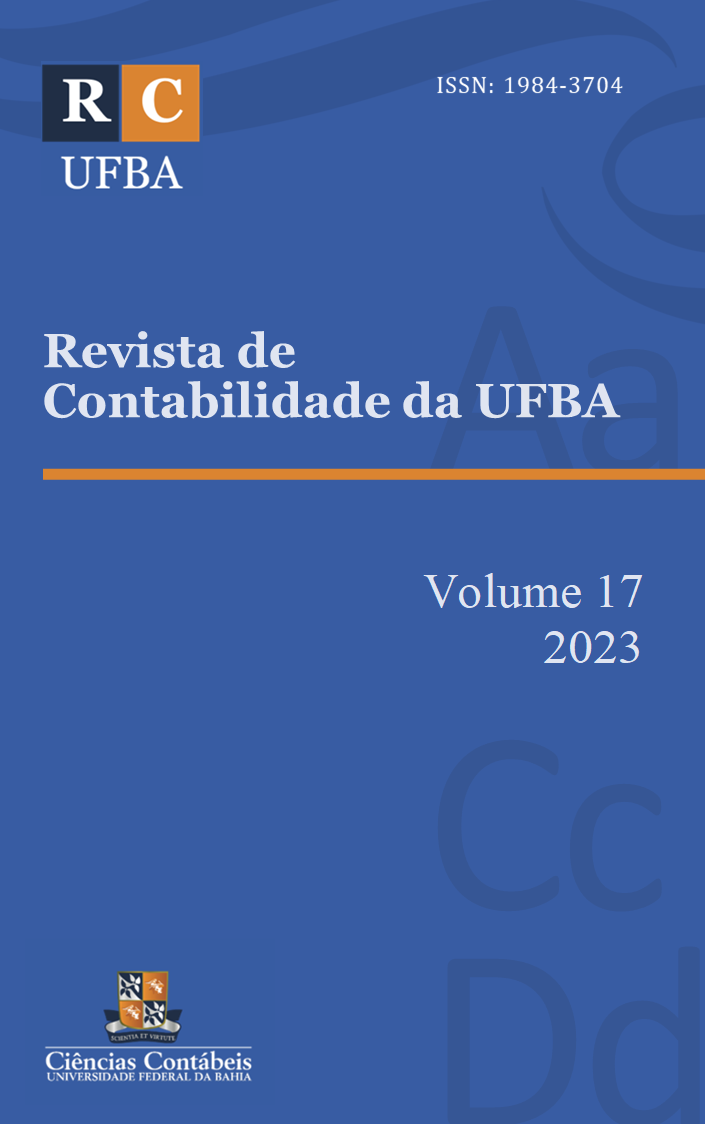Data Validation and Scientific Assumption of Impartiality in Accounting by Horkheimer’s Verstand
DOI:
https://doi.org/10.9771/rcufba.v17i1.55133Keywords:
Data Validation and Impartiality. Positivism. Verstand. Horkheimer. Critical Theory.Abstract
In this paper we discuss by Horkheimer’s perspective of instrumental reason (verstand), aspects related to data validation and impartiality in accounting research. In proposing the denial of absolute truth, Adorno & Horkheimer (1985) distinguishes two reasons: Verstand (instrumental reason) and Vernunft (substantial reason). The Verstand, as an expression of modernity and it science, is the character of reason purely formal, operational, ordering data. In other words, Verstand is the idea that the truth is known, or which must first seek a formula to put into practice only after. On the other hand, Vernunft is dialectical reason, a temporary fact, due to historical factors. Through Vernunft is possible to question the unquestionable, overcome the conclusive truth and objective authority. Thus, we show briefly an evolutionary view of accounting in order to highlight the development of accounting thought until a traditional theoretical perspective adopted. Then we make a counterpoint to this traditional perspective by verstand. In our discussion, we claim from researchers a choice between vernunft or verstand and make clear the data limitations into interpretations inside instrumental idea. We do not intend to propose in this article any ways to change the current paradigm in accounting. On the contrary, supported in Adorno (2009) displays as negative dialectics, this article aims solely to foster and mature debate, supported the substantial reason (Vernunft). As a result, by adding the verstand perspective in accounting research some interesting insights and interpretation will be provided by future research. In so doing, we expect a special attention to epistemological position which improve the data validation.
Downloads
References
Laughlin, R. (1995). Empirical research in accounting: alternative approaches and a case for “middle-range” thinking. Accounting, Auditing & Accountability Journal, 8(1), 63-87.
Lippman, E. J., & Wilson, P. A. (2007). The culpability of accounting in perpetuating the Holocaust. Accounting History, 12(3), 283-303.
Maali, B., & Jaara, O. (2014). Reality and Accounting: the case for interpretative accounting research. International Journal of Accounting and Financial Reporting, 4(1), 155.
Marcuse, H. (1989). Razão e revolução. Tradução de Marília Barroso. Rio de Janeiro: Editora Saga.
Matos, O. (1989). Os Arcanos do Inteiramente Outro: a Escola de Frankfurt, a melancolia e a Revolução. São Paulo: Brasiliense.
Mattessich, R. (1980). On the evolution of theory construction in accounting: a personal account. Accounting and Business Research, 10(37A), 158-170.
Mattessich, R. (1995). Conditional-normative accounting methodology: incorporating value judgments and means-end relations of an applied science. Accounting, Organizations and Society, 20(4).
Mcnichols, M., & Wilson, G. P. (1998). Evidence of earnings management from the provision for bad debts. Journal of Accounting Research, 1-31.
Merchant, K. A. (2010). Paradigms in accounting research: A view from North America. Management Accounting Research, 21(2), 116–120.
Parker, L. D. (2012). Qualitative management accounting research: Assessing deliverables and relevance. Critical Perspectives on Accounting, 23(1), 54–70.
Power, M. (2010). Fair value accounting, financial economics and the transformation of reliability. Accounting & Business Research, 40(3).
Ryan, B., Scapens, R. W., & Theobald, M. (2002). Research Method and Methodology in Finance and Accounting (2th ed). Thomson.
Ribeiro Filho, J. F., Lopes, J. E., Feitosa, M. G., & Pederneiras, M. (2009). Base epistemológica para a teoria da contabilidade. Em J. F. Ribeiro Filho, J. E. Lopes, & M. Pederneiras, Estudando Teoria da Contabilidade. São Paulo: Atlas.
Ro, B. T. (1980). The adjustment of security returns to the disclosure of replacement cost accounting information. Journal of Accounting and Economics, 2(2).
Ronen, J. (2008). To fair value or not to fair value: a broader perspective. ABACUS, 44(2).
Schaefer, T. (1984). The accounting information content of current cost income relative to dividends and historical cost income. Journal of Accounting Research, 22(2).
Schimidt, P., & Santos, J. L. (2008). História da contabilidade: foco na evolução das escolas do pensamento contábil. São Paulo: Atlas.
Scott, W. R. (2011). Financial Accounting Theory. London: Pearson.
Skinner, D. J., & Sloan, R. G. (2002). Earnings surprises, growth expectations, and stock returns or don’t let an earning torpedo sink your portfolio. Review of Accounting Studies, 7(2-3), 289-312.
Sutton, T. G. (1988). The proposed introduction of current cost accounting in the UK: determinants of corporate preference. Journal of Accounting and Economics, 10(2).
Suzuki, T. (2003). The Epistemology of Macroeconomic Reality: The Keynesian Revolution from an Accounting Point of View. Accounting, Organizations and Society, 28(5).
Tucker, J. W., & Zarowin, P. A. (2006). Does income smoothing improve earnings informativeness? The Accounting Review, 81(1), 251-270.
Whittington, G. (2008). The fair value and the IASB/FASB conceptual framework project: an alternative view. ABACUS, 44(2).
Zeff, S. A. (2007). The SEC rules historical cost accounting: 1934 to the 1970’s. Accounting & Business Research, 37.
Downloads
Published
How to Cite
Issue
Section
License
Copyright (c) 2023 Revista de Contabilidade da UFBA

This work is licensed under a Creative Commons Attribution-NonCommercial 4.0 International License.
Autores que publicam nesta revista concordam com os seguintes termos:- Autores mantém os direitos autorais e concedem à revista o direito de primeira publicação, com o trabalho licenciado simultaneamente sob uma Licença Creative Commons Attribution CC-BY-NC após a publicação, permitindo o compartilhamento do trabalho com reconhecimento da autoria do trabalho e publicação inicial nesta revista.
- Autores têm autorização para assumir contratos adicionais separadamente, para distribuição não-exclusiva da versão do trabalho publicada nesta revista (ex.: publicar em repositório institucional ou como capítulo de livro), com reconhecimento de autoria e publicação inicial nesta revista.
- Autores têm permissão e são estimulados a publicar e distribuir seu trabalho online (ex.: em repositórios institucionais ou na sua página pessoal), já que isso pode gerar alterações produtivas, bem como aumentar o impacto e a citação do trabalho publicado.















 This work is licensed under a license
This work is licensed under a license 